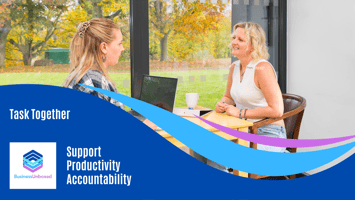Practical Support for Your Small Business Starting a small business is an exciting adventure, but...
The Stigma of Seeking Help
Since I was little I have been fiercely independent. I still haven’t really got to the bottom of why I have always felt the need to ‘own’ my undertakings and feel so ‘squirmy’ about seeking help from others, particularly the formal ‘coaching and mentoring’ kind of help. I was always the girl that, when told it can’t be done, said, “wanna bet?” If only I had recognised the value of seeking help in my youth, when the wheels literally came off my go-kart building project! But as I have matured, I have come to appreciate that there is power in knowing yourself well enough to see where and how you could benefit from having some guidance.
I feel proud of my determination to stand on my own two feet, both financially and practically, but I can also see that my independent streak has sometimes prevented me from reaching out to others for a bit of assistance when it would have really helped.
The Stigma of Seeking Help
So what’s behind this sense that so many of us have of needing to do it alone? One of the primary reasons seeking coaching and mentoring can feel like admitting defeat is the pervasive stigma associated with asking for help. From an early age, many individuals are socialised to value independence and self-sufficiency. As a bright girl, growing up in the late 20th century, I was certainly sold the notion that I could have my cake and eat it. As a modern woman I could get a degree, build a business, rear a child, walk the dog, keep the house tidy, cook wholesome dinners and dress like I walked out of the pages of the Boden catalogue. Any self-respecting capable person should be able to handle all challenges alone - a view that is deeply ingrained in our culture, whether you’re a man or a woman (or however you choose to identify). As a result, admitting the need for guidance can be perceived as a sign of weakness or inadequacy.
In professional settings, this stigma is often magnified. The competitive nature of many industries fosters an environment where vulnerability is viewed as a liability. Employees may fear that seeking coaching or mentoring will be interpreted as a lack of competence, potentially jeopardising their career prospects. This fear is not entirely unfounded, as some organisational cultures still equate self-reliance with capability and success.
The Myth of the Self-Made Individual
There’s a phrase, isn’t there, about the ‘overnight success a decade in the making’ that captures this whole, foolish myth of the self-made individual. Social media (irony noted) has really embedded this notion that you can truly be self-made, and this further complicates the perception of coaching and mentoring. Stories of successful entrepreneurs and influencers (give me strength) who supposedly achieved greatness through sheer determination and individual effort are glorified in popular culture. These narratives, while inspiring, often overlook the support systems and networks that play a crucial role in any success story. It takes a village to raise a child, I contend that it takes a network to build a business.
The Psychological Barrier: Ego and Pride
Ego and pride also play significant roles in the resistance to seeking coaching and mentoring. Accepting guidance requires acknowledging that there are areas where one can improve, which can be a blow to one's self-esteem. For individuals who derive a sense of identity and self-worth from their expertise and competence, admitting the need for help can be particularly challenging. The prospect of revealing gaps in knowledge or skills to a mentor or coach can trigger feelings of embarrassment or shame.
The Reality: Strength in Vulnerability
Despite these challenges, it is crucial to reframe the narrative around coaching and mentoring. Seeking support does not signify defeat; rather, it is an act of strength and self-awareness. Recognising the need for guidance is a critical component of personal and professional growth. It demonstrates a willingness to learn, adapt, and evolve, which are essential qualities for long-term success.
Coaches and mentors offer valuable perspectives and experiences that can accelerate development and provide insights that may not be accessible through self-reflection alone. Moreover, the mentor-mentee relationship is often a two-way street, where mentors also gain satisfaction and growth from the interaction.
Finding a good fit
Coaching and Mentoring doesn’t have to be long-term and ‘deep and meaningful’. Sometimes it is short, highly focused on a goal and very practical. When coaching and mentoring is done well it doesn’t feel like coaching and mentoring, it feels like a conversation with a trusted person. Talking things through with someone who has no agenda other than helping you find what works best for you. It doesn’t have to feel ‘squirmy’ and uncomfortable. It should feel like progress, a growth in confidence and an opportunity to kick ideas around with a thoughtful friend. Sometimes that trusted, ‘critical friend’ will have to haul you back to the main topic of conversation, or challenge you to think differently about things, but it shouldn’t feel artificial or formulaic. Well, not in my view anyway.
At Business Unboxed, we specialise in providing support for start-ups and small businesses to help you focus on finding the right fit for you. Drop us a line if you’d like to chat.




